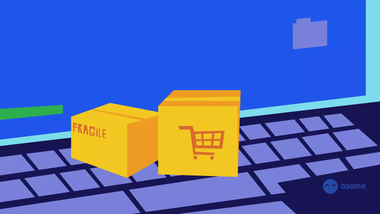Paypal vs Stripe: Comparing Pros & Cons of 2 Payment Gateways
As an e-commerce business owner, you would have heard of payment gateways PayPal and Stripe. With these two big platforms being the most popular online payment gateways, you may face a dilemma when it comes to deciding which payment gateway to use.

The age of e-commerce is only beginning. From hosting providers, store plug-ins to marketing strategies, there are so many factors to consider. This also begs the question of how you should accept payment.
As an e-commerce business owner, you would have heard of payment gateways PayPal and Stripe. With these two big platforms being the most popular online payment gateways, you may face a dilemma when it comes to deciding which payment gateway to use. Fret not - read on as we break down the pros and cons of each platform so you can make a well-informed decision that works best for your business.
By the way, we’re your friendly corporate service support assistant, helping you with all your back-end tasks like accounting especially for ecommerce businesses. If you’re ready to take the next step, find out more about how we can help you relieve the burden of routine paperwork!
What Is A Payment Gateway?
Think of payment gateways as how to collect payment from customers online. Simply put, the point-of-sale terminal at your physical retail store, only better. It can authenticate and authorise payment between your online store and your shoppers, using front-end technology to convey shopper information to your merchant-acquiring bank to process the transaction. Your shoppers can pay via credit cards, debit cards and other modes of payment in a fast and secure manner.
Both PayPal and Stripe offer payment gateways as part of their service, which is vital for businesses looking to accept payments online.
What Do PayPal and Stripe Do?
PayPal was founded in 1998, while Stripe was founded in 2011. Both PayPal and Stripe offer payment gateways as part of their service, which is crucial for businesses looking to accept payments online.
In summary, these platforms provide a solution for your online store to accept payments while guarding the financial data between your store, customers and credit card networks.
Can I Use More Than One Payment Gateway?
If you can use more than one payment gateway, that’s one problem solved right? Unfortunately, that’s not how payment gateways work. Unless you are a big brand like UNICEF or incredibly tech savvy, you would be looking for extra trouble. With two payment gateways come two times more vendors, which also means that twice as many things can go wrong.
Furthermore, you will miss out on volume pricing discounts that are usually based on sales volumes. If you have other back-end integrations, product or service development could pose a challenge, which is not practical for a small business.
What Is PayPal?
As a reputable global payment gateway, PayPal is a good option if you want to get your business up and running in no time. With approximately 400 million worldwide active accounts, this global leader accepts a wide range of credit cards and debit cards and even offers seller protection, two-factor authentication, and 24/7 fraud protection. PayPal offers two common checkout options of PayPal Standard and PayPal Express.
PayPal Standard is similar to your usual checkout process, which means that your shoppers will have to input their information on your site before they get redirected to PayPal for their credit card payment. PayPal Express expedites the checkout process by allowing shoppers to simply log in with their existing PayPal account, eliminating the need for shoppers to key in their shipping or billing information.
PayPal Website Payments Pro is also available for companies in Hong Kong, with a fixed HK$200 monthly fee. This allows you to accept payments with a completely customisable solution, leveraging the PayPal Payflow Gateway to transfer payments to your PayPal Internet Merchant Account. Additionally, it also provides you with the versatility to change payment gateways without having to rebuild your technical integration.
If you are looking to expand your brand internationally, PayPal could be a feasible way since it supports 25 currencies and is available in over 200 countries.
What Is Stripe?
Popular among sellers in the United States, United Kingdom, as well as other Western countries, Stripe is a payment gateway known for its simplicity and a user-friendly dashboard. A relatively new player in Hong Kong’s e-commerce landscape, Stripe was launched in 2016.
Stripe provides both one-time payment and recurring payment options, and can even support more complex billing models depending on your business needs.
Online Payment Gateway Comparison
Each payment gateway definitely has its advantages and disadvantages. Which is the best payment gateway? Let’s compare to find out more.
Transaction Fees
Take note that PayPal charges high transaction fees, starting from 2.9% of the total value of transactions, plus an extra HK$2.35 fee per payment. Foreign payments will incur an even higher 4.4% fee, with additional currency conversion fees. For merchants with high sales volumes, PayPal offers discounts at the same rates as Stripe.
Ideal for startups and small businesses, Stripe charges a reasonable transaction fee of 3.4% on each card charge, plus a HK$2.35 transaction fee. Stripe’s fees for merchants based in Hong Kong are in line with its fees in Singapore and other Asian markets.
Ease Of Use
Both PayPal and Stripe are known for their ease of use, simplifying payments for customers.
For the average merchant, PayPal Commerce will be a lot easier to navigate, since you will have to set up your payment processing. PayPal offers developer tools, but they are designed such that anyone can effectively set up and receive payments. If you have no issues with PayPal’s basic functionality, you can simply paste some code into your online store and get ready to roll.
Meanwhile, Stripe has third-party e-commerce platform integration for easy setup, which is typically in the form of a plug-in.
Ease Of Setup
While PayPal offers ease of use, this comes at the cost of its potential. On the other hand, Stripe is a lot more customisable.
If you are a developer yourself or have the help of a developer, you can customise Stripe in ways that PayPal might not be able to. For instance, you can embed a ‘Pay With Card’ button on your online store with Stripe if you have the development knowledge.
Availability
Compared to Stripe, PayPal is available in many more countries. PayPal is currently offered in over 200 countries, while Stripe is available in 35 countries, although it is growing rapidly.
Technical Support And Customer Service
Both PayPal and Stripe are competent when it comes to technical support and customer service:
| PayPal | Stripe | |
|---|---|---|
| Live Chat | Available, in the form of a Chatbot | Available |
| Phone Support | Available | Available |
| Available | Available | |
| Knowledge Base | Available | Available |
| Community Forum | Available | Available |
| Social Media | Available | Not available |
Dispute And Chargeback Fees
Chargebacks are troublesome for everyone involved. When a customer initiates a chargeback, you can expect to experience extra fees on top of your payment left in limbo.
A chargeback is a charge reversal when a customer contacts the bank to report a card transaction that they do not agree with. This exists to protect the cardholders, but when it is over utilised, it can be frustrating for your business as you will have to bear the fee every time a chargeback occurs.
PayPal imposes a chargeback fee of USD 20 for all United States-based transactions, with varying rates for international transactions. Stripe charges a lower rate of USD 15 for its chargeback fee.
Also, if your shopper receives a refund, you will not be getting your processing fees back from PayPal or Stripe.
Security
Both PayPal and Stripes’ services are Payment Card Industry (PCI) Compliant. This meets that they adhere to the strict standards of the Payment Card Industry and your cardholder data is securely stored.
Checkout Payment Page
An ideal checkout flow will boast a smooth, frictionless user experience.
Stripe has a breezy checkout process that enables your shoppers to make payments without leaving your online store. Your shopper simply has to key in their credit card number, hit submit, and get redirected to your follow up or thank you page depending on your settings.
However, PayPal’s checkout experience is not quite as simple. Your customers will be required to leave your online store, sign in to a PayPal account and get redirected to your online store, which may lead to branding inconsistency from the start to the end of the user experience journey. There will also be extra load times, which could result in higher rates of shopping cart abandonment or bounce rates.
Which Payment Gateway Is Most Ideal For My Business Needs?
StillUSD 20 having difficulties deciding? Here’s a quick breakdown of the two platforms.
Opt for PayPal if you…
- You intend to expand overseas
- You want an easy-to-use payment solution
- You intend to make use of PayPal’s digital wallet ecosystem
Opt for Stripe if…
- You run a business with specific and complex e-Commerce requirements
- You prefer competitive flat-rate pricing
- You have a developer or are a developer yourself
PayPal Vs Stripe
| PayPal | Stripe | |
|---|---|---|
| Transaction Fees |
|
|
| Ease of Use | Offers tools designed for anyone to use | Third-party e-commerce platform integration for easy setup |
| Ease of Setup | Minimal | Many customisable functions |
| Availability | Offered in over 200 countries | Available in 35 countries |
| Technical Support and Customer Service | Available | Available |
| Dispute and Chargeback Fees | USD 20 for all United States-based transactions, with varying rates for international transactions | USD 15 |
| Security | Payment Card Industry (PCI) Compliant | Payment Card Industry (PCI) Compliant |
| Checkout Experience | Your customers will have to leave your online store to make payment before being redirected back | Allows your customers to make payment without leaving your online store |
Save time, free your mind and focus on your business
We know how time-consuming the process of selecting a payment gateway can be -- outsource the accounting to us so you can focus on what matters most to your business.
We've got an expert who has your back, and does accounting and optimises tax for your business. We advise what tax exemptions and tax reliefs your company is entitled to and our corporate secretaries help you file documents to the authorities on time, and we organise your reports exactly the way needed to comply.
Don’t take our word for it though, try out for yourself today! Book a demo with our team, and let your accounting woes be a thing of the past!







